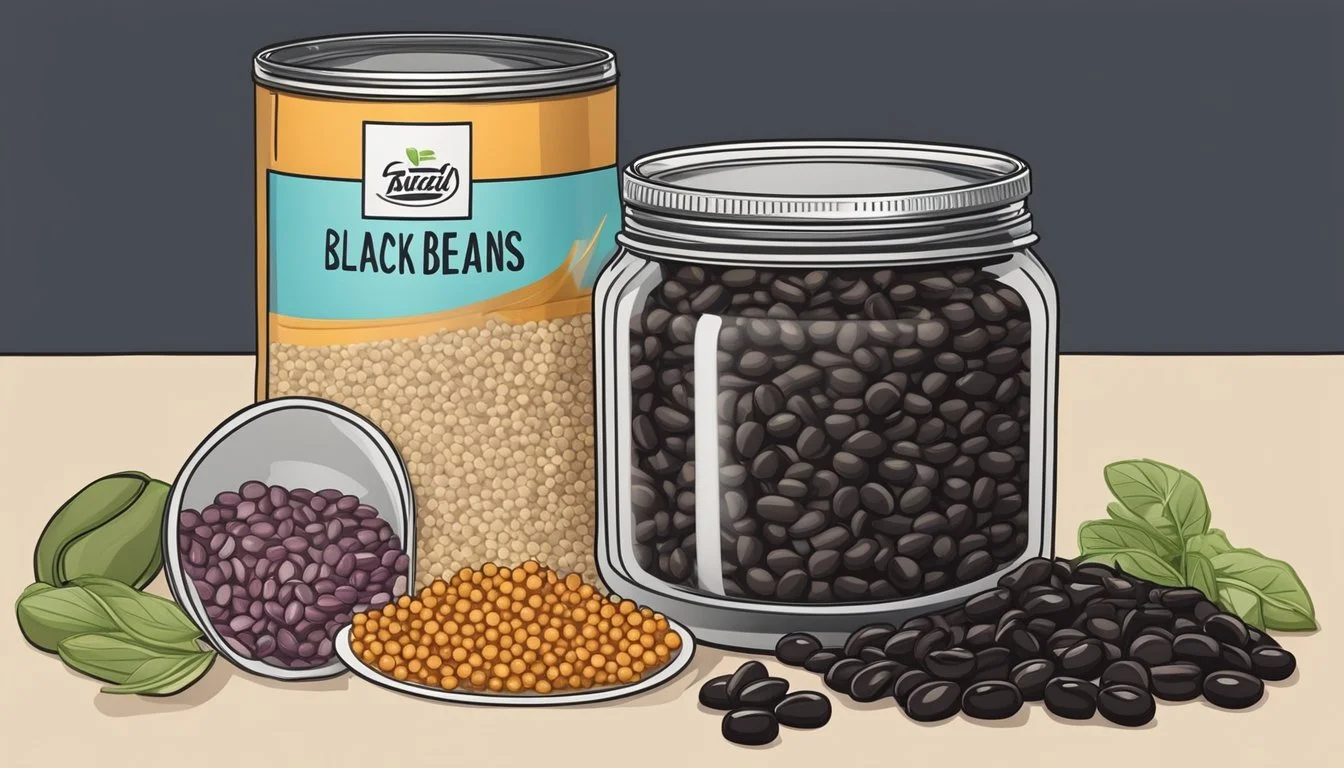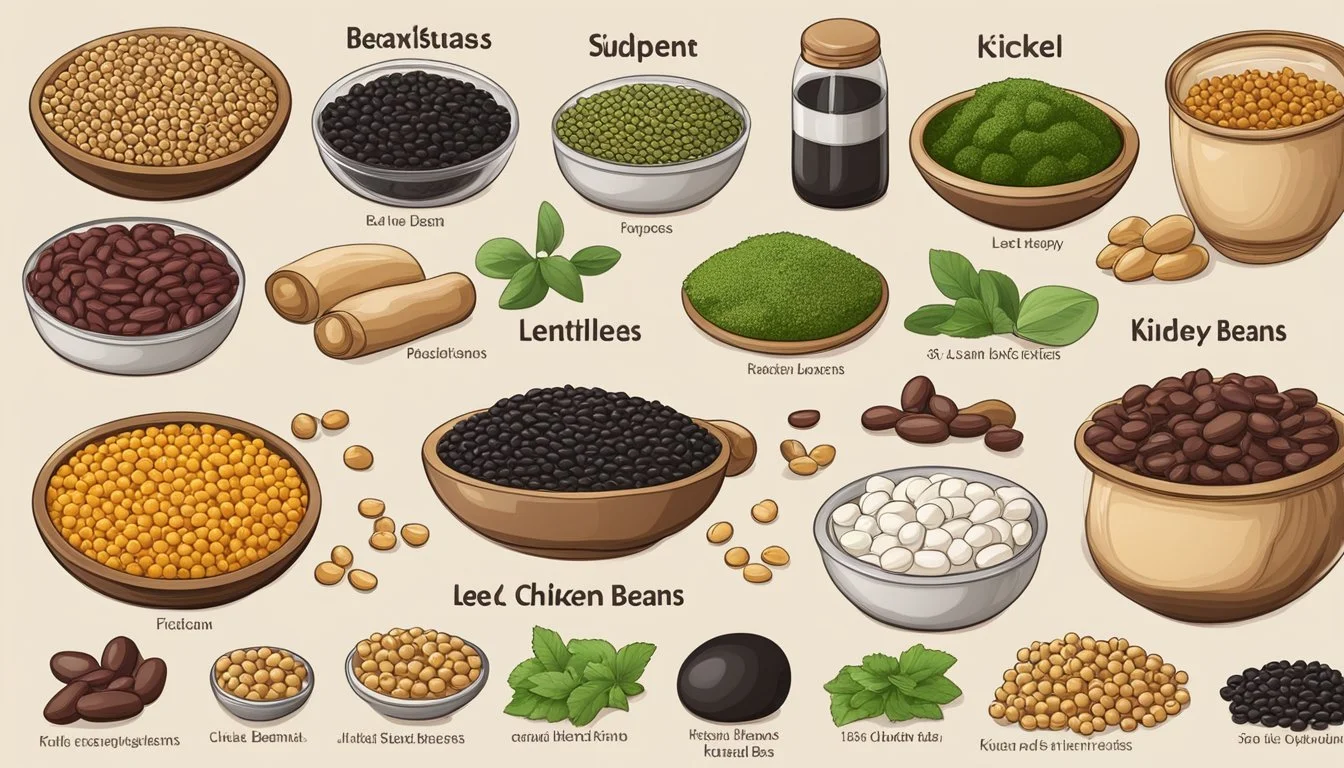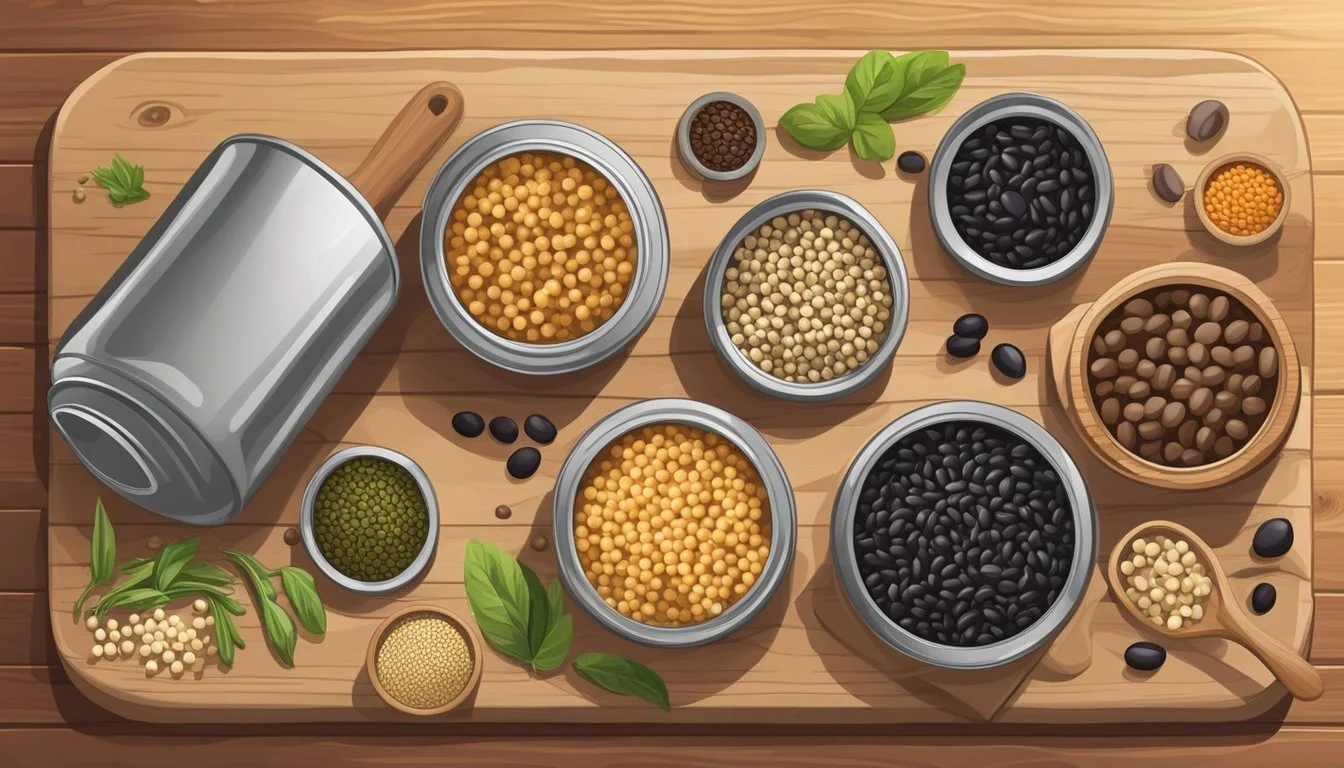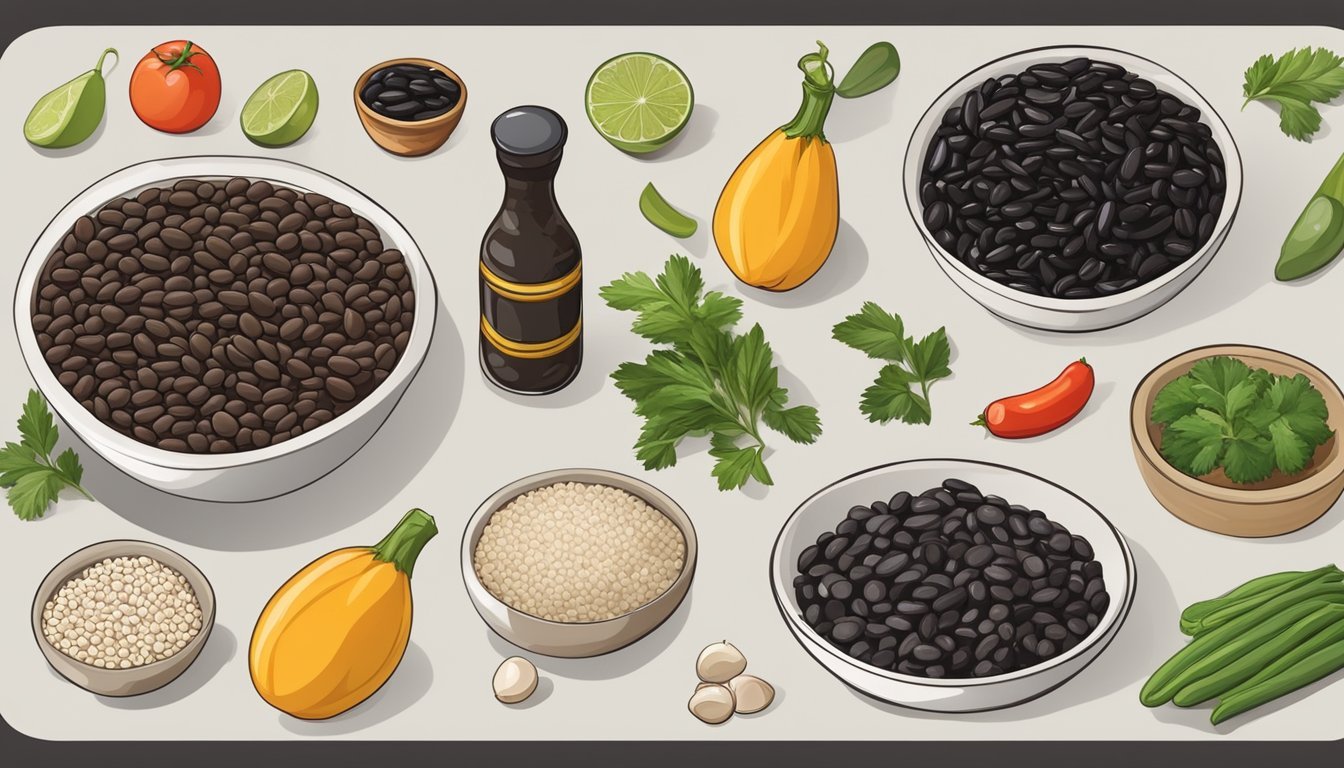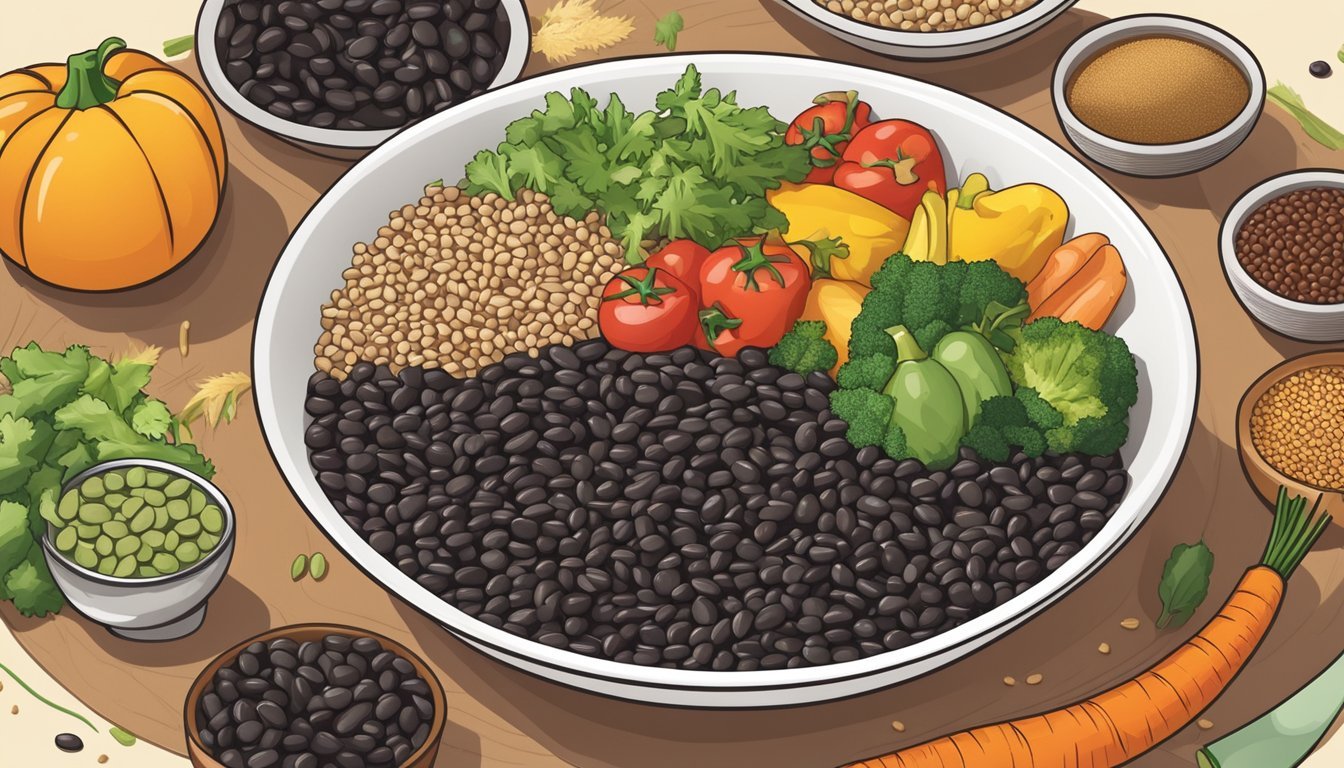Black Beans Substitutes
Top Alternatives for Every Recipe
Black beans are a staple in many kitchens, known for their high protein and fiber content, making them a popular choice among vegans and health enthusiasts. Choosing the right black bean substitute can be crucial for maintaining the nutritional balance in a recipe. Chickpeas, for instance, offer a higher calorie count but still provide substantial protein and fiber, making them an excellent swap.
Pinto beans are another versatile alternative, particularly favored in Mexican-style dishes. Their creamy texture and mild flavor align well with traditional recipes, creating a seamless transition in taste and mouthfeel. For those looking for a low-carb option, cauliflower serves as a unique substitute, providing a healthy and nutrient-packed alternative without compromising on the nutritional benefits.
These black bean substitutes can transform your dishes while ensuring they remain nutritious and delicious. Whether you're aiming for a similar texture or an innovative twist, these options can cater to various dietary needs and preferences.
Importance of Bean Substitutes
Substituting black beans with other options can provide similar nutritional benefits and adapt to various dietary needs. Additionally, these substitutes can enhance different culinary applications with their unique textures and flavors.
Nutritional Considerations
Different substitutes for black beans maintain essential nutrients like protein, fiber, and vitamins. Kidney beans, pinto beans, and chickpeas are rich in protein, which is vital for muscle repair and overall health. For instance, 1 cup of chickpeas contains approximately 15 grams of protein. Substitutes like cauliflower offer important vitamins and minerals, such as vitamins C and K, while being low in calories. Including these alternatives can help individuals keep a balanced diet and ensure adequate intake of nutrients like iron, calcium, and potassium.
Dietary Adaptations
People with specific dietary restrictions, such as vegetarian or vegan lifestyles, can greatly benefit from using black bean substitutes. Alternatives like soybeans and lentils are excellent sources of plant-based protein and dietary fiber, making them suitable for those aiming to avoid animal products. Additionally, options like tofu can be used by those looking to lower fat intake while still enjoying a meatless protein source. These substitutes cater to various dietary needs, ensuring that nutritional requirements can still be met without relying on black beans.
Cooking Applications
Different substitutes can be utilized in various recipes, depending on the required texture and flavor profile. For example, mushrooms can provide a meaty texture and umami flavor, making them a good substitute in stews and soups. Pinto beans, with their creamy texture, can be used effectively in baking and casseroles. Peas offer a versatile option, as they can be used fresh, frozen, or canned, and are convenient for quick-cooking dishes. By experimenting with these substitutes, individual preferences and dish requirements can be satisfied while maintaining the integrity of the meal.
Common Black Bean Substitutes
There are several effective substitutes for black beans that each bring unique textures and flavors to dishes. This section explores kidney beans, pinto beans, chickpeas, and lentils.
Kidney Beans and Their Uses
Kidney beans are a great match for replacing black beans in various dishes due to their similar texture and earthy flavor. These beans are commonly used in chili and other hearty stews.
Kidney beans are rich in nutrients such as iron, magnesium, and potassium. They hold their shape well during cooking, making them suitable for soups and salads. While their flavor is milder compared to black beans, they still provide a robust presence in dishes.
In Mexican dishes like burritos and tacos, kidney beans can effectively replace black beans without compromising taste. When cooking, it's advisable to soak and simmer them properly to achieve the desired texture.
Pinto Beans as a Versatile Option
Pinto beans are a popular choice in Mexican food, known for their creamy texture and slightly nutty flavor. They are often used in refried beans and can be swapped directly with black beans.
These beans add a meaty texture to dishes, making them versatile for use in tacos, chili, soups, and salads. Pinto beans also absorb flavors well, enhancing the overall taste of the dish they are in.
While they are softer than black beans, their ability to blend seamlessly into various recipes makes them a favored substitute. They also provide nutritional benefits similar to black beans, including protein and fiber.
Chickpeas and Their Unique Qualities
Chickpeas, also known as garbanzo beans, offer a distinct mild flavor and a firm, meaty texture. They are higher in calories compared to black beans, but they are equally nutritious, providing protein, fiber, and essential vitamins.
Chickpeas are incredibly versatile and can be used in numerous dishes from hummus to salads. They can be added to soups for a heartier meal or used in casseroles.
One of the key distinctions is their ability to hold up well to longer cooking times, making them suitable for slow-cooked dishes. Chickpeas' firm texture allows them to maintain integrity in various culinary applications.
Lentils: A Protein-Packed Choice
Lentils, including red, green, brown, and beluga varieties, are excellent protein-packed alternatives to black beans. They cook faster and do not require soaking, making them a convenient option.
Lentils have a slightly earthy flavor and come in various textures, from soft red lentils to firm green and brown lentils. This makes them suitable for different dishes, whether as a base for soups or a hearty addition to stews.
Beluga lentils, in particular, provide a rich texture similar to black beans and can be used in salads and as a side. Lentils are notable for their nutritional profile, offering a high amount of protein and fiber.
Other Legume Substitutes
When looking for black bean alternatives, other legumes offer similar textures and nutritional benefits. This section explores peas, black-eyed peas, soybeans, and more, detailing their uses and advantages.
Substituting with Peas
Peas serve as a versatile black bean substitute in various recipes. Green peas are an excellent option for soups and stews due to their mild flavor and quick cooking time. They can be used fresh, frozen, or canned, providing flexibility based on availability.
Black-eyed peas have a slightly sweet taste, making them ideal for Southern dishes. They are protein-rich and offer a similar texture to black beans, making them suitable for casseroles and salads. Their nutrient profile adds valuable vitamins and minerals to any meal.
Unique Substitutes: Soybeans and More
Soybeans provide a unique and high-protein alternative to black beans. Available in forms such as edamame, tofu, and tempeh, soybeans can be used in stir-fries, soups, and salads. Each form offers distinct textures and flavors, broadening culinary possibilities.
Mung beans are another option known for their versatility. They can be used in everything from soups to desserts, and their quick cooking time makes them convenient. Edamame, a young soybean, is particularly good in salads and as a snack, offering a protein-packed choice.
By exploring these legume substitutes, you can find suitable alternatives that maintain the integrity and nutritional value of your dishes.
Non-Legume Alternatives
For those seeking non-legume substitutions for black beans, various grains, nuts, and vegetables can provide texture and nutrients, meeting different culinary needs and preferences.
Grains and Nuts as Substitutes
Quinoa offers a versatile option rich in plant-based protein. Its slightly nutty flavor complements various dishes, such as salads and stuffed peppers. Quinoa also boasts essential amino acids.
Rice, particularly brown or wild, serves as a base in many recipes, providing a chewy texture and mild taste. It's an easy, gluten-free substitute.
Nuts and nut butter like almonds or cashews offer a hearty texture for meat-free dishes. Almond butter can be incorporated into sauces, enhancing flavor and adding protein.
Oats can work well in recipes needing a binding agent, such as veggie burgers. They help maintain structure and provide a slightly chewy bite.
Vegetables and Other Plant-Based Options
Cauliflower is a popular choice for its meaty texture and adaptability. One can dice it small to mimic black beans in stews or casseroles. It’s low in calories and high in nutrients.
Mushrooms bring a rich, umami flavor to dishes. When finely chopped, they can replace black beans in tacos or burgers, offering a robust taste and satisfying bite.
Zucchini can be a suitable substitute, especially for stuffing or casseroles. Its mild flavor and ability to absorb spices make it a flexible ingredient.
Sweet potatoes provide sweetness and a creamy texture. They are particularly good in soups or baked dishes, blending seamlessly with other ingredients.
These alternatives ensure that meals remain flavorful and nourishing without the use of legumes.
Substitutes in International Cuisine
Different cuisines across the globe offer unique alternatives to black beans, allowing for flexibility in various traditional dishes. These substitutes often maintain the dish’s texture and enrich it with diverse flavors.
Cannellini Beans in Italian Dishes
Cannellini beans, also known as white kidney beans, are a common substitute for black beans in Italian cuisine. Their creamy texture and mild flavor integrate well into soups, stews, and casseroles.
In classic Italian dishes like minestrone, these beans provide the necessary heartiness. They work well in pasta e fagioli, a traditional pasta and bean soup. Cannellini beans also absorb flavors effectively, making them ideal for dishes with robust tomato sauces and herbs.
Using Navy and Great Northern Beans
Navy beans and Great Northern beans serve as excellent substitutes due to their similar texture and mild flavor profile. Navy beans, small and creamy, are ideal for baking and soups.
Great Northern beans are slightly larger with a creamier texture, making them suitable for dishes where a more substantial presence is desired. Both are great for Mexican cuisine, blending seamlessly into enchiladas and tacos, where they mimic the texture of black beans.
In baked dishes, these beans can replace black beans while still delivering a smooth and satisfying consistency.
Black Bean Sauce and Asian Flavors
Black bean sauce, a staple in many Asian dishes, often utilizes fermented black soybeans for its distinctive and savory flavor. This sauce pairs well with stir-fries, noodles, and marinades.
For those looking to substitute black beans directly in Asian recipes, fermented soybeans or tofu can be used to maintain a protein-rich profile. These alternatives provide a similar depth of flavor, essential for Asian dishes like mapo tofu or black bean chicken.
The versatility of these substitutes ensures that dietary preferences and ingredient availability do not compromise the authenticity and richness of international cuisine.
Health and Nutritional Profile of Substitutes
Substituting black beans with other legumes and vegetables can affect the nutritional profile of your meals. These substitutes vary in caloric content, fiber, essential minerals, and their compatibility with special diets.
Caloric and Fiber Content
Different substitutes for black beans offer varying levels of calories and fiber. For instance, chickpeas contain about 165 calories per 100 grams, while black beans have approximately 90 calories for the same weight. Cauliflower, another substitute, is low in calories but rich in dietary fiber.
Substitute Calories (per 100g) Fiber (g per 100g) Black Beans 90 6.4 Chickpeas 165 7.6 Cauliflower 25 2.5 Pinto Beans 143 9.0
Minerals and Vitamins
Substitutes for black beans also differ in their mineral and vitamin content. Chickpeas are rich in iron, magnesium, and folate, making them excellent for maintaining essential nutrient levels. Pinto beans offer high levels of potassium, fiber, and vitamin B6, while black-eyed peas provide significant amounts of folate and manganese.
Kidney beans and lentils are good sources of copper and iron. Additionally, cauliflower contributes vitamin C and folate. These nutrients play crucial roles in maintaining overall health, from supporting immune function to aiding in red blood cell formation.
Benefits for Special Diets
Many black bean substitutes fit well into various dietary plans, particularly vegan and vegetarian diets. Chickpeas and lentils provide ample plant-based protein, making them suitable for those avoiding animal products. Cauliflower caters to low-calorie and low-carb diets.
Black-eyed peas and pinto beans are great alternatives for those needing gluten-free and nutrient-dense options. Both are versatile and can be easily included in numerous dishes, from salads to stews, aiding individuals in achieving balanced nutrition without compromising on dietary needs.

